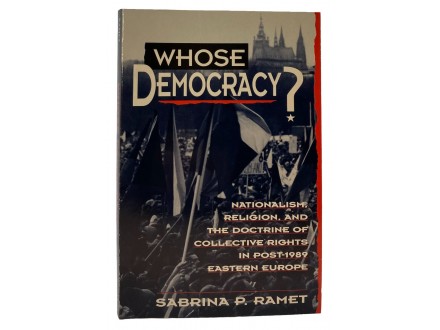Sabrina P. Ramet - Whose Democracy?
| Cena: |
| Želi ovaj predmet: | 1 |
| Stanje: | Polovan bez oštećenja |
| Garancija: | Ne |
| Isporuka: | Pošta CC paket (Pošta) Post Express |
| Plaćanje: | Tekući račun (pre slanja) |
| Grad: |
Novi Sad, Novi Sad |
ISBN: Ostalo
Godina izdanja: 1997
Autor: Domaći
Jezik: Srpski
U dobrom stanju, sa posvetom autorke (PROVERITI)
Publisher : Rowman & Littlefield Publishers; No Additional Printings Listed edition (January 1, 1997)
Language : English
Paperback : 300 pages
Item Weight : 11.8 ounces
Dimensions : 5.82 x 0.55 x 8.96 inches
The years since the collapse of communism in 1989 have witnessed a dangerous renewal of religious intolerance and nationalist demands across Eastern Europe. In this provocative application of moral philosophy to the analysis of contemporary political processes in the region, Sabrina Ramet draws upon the literature of Natural Law to demonstrate that liberal democracy depends on a delicate balance between individual and societal rights. Exploring the situation of Hungarians in Slovakia, Albanians in Kosovo, theoretically-inclined Catholic bishops in Poland, Serbs in Croatia, and contending forces in post-Dayton Bosnia, Ramet contends that the terms of dispute in these cases can be deceptive. She illustrates that claims made on the basis of what she calls the doctrine of collective rights actually subvert the liberal democratic project.
Review
An important intervention in the debate over national conflicts and national rights, especially with regard to the former Yugoslavia. Arguing against the too-commonly accepted premise that `one is, in the first place, a Serb or a Croat or a Muslim, and only derivately a human being enjoying certain rights,` Ramet aims both to present a plausible alternative to the dominance of collectivist understandings and to spark a debate about other possible normative understandings of conflict. Whose Democracy? is classic Ramet. It is often impressive in its scope and ambition. (Habsburg)
Ramet . . . takes a strong philosophical and moral stand against regimes that violate human rights and freedoms. . . . This book is not only an excellent, brief survey of how certain East European governments lost their moral compass, but also a trenchant primer on how they can find it again. Highly recommended for undergraduate and graduate students, and above. (J. Bendix Choice)
This book is an excellent brief survey of how certain East European governments lost their moral compass but also a trenchant primer on how they can find it again. (J. Bendix Choice April 1998)
Sabrina Ramet offers a timely, thought-provoking examination of collective rights in East European States in the post-Soviet era. This rich work highlights the use of such rights regimes to create and manipulate ethnic and/or religious tensions, demonstrating these regimes` incompatibility with liberal democracy. (Janet E. Adamski Journal Of Church And State)
An outstanding intellectual achievement. (Frank Cibulka)
Sabrina P. Ramet is professor of international studies at the University of Washington.
L_I_Č_N_O______P_R_E_U_Z_I_M_A_NJ_E_:
Za kupovine ukupne vrednosti preko 2.000 dinara moguće lično preuzimanje u Cara Dušana u Novom Sadu. Ako je za pojedinačnu knjigu navedena samo opcija Pošta, lično preuzimanje samo te knjige nije moguće. U Novom Sadu moguća je lična dostava i plaćanje preko službe Eko-kurir (cena je 250-300 din).
STANJE KNJIGE:
Knjiga koju dobijate je ona koja je na slici. Ukoliko nije naznačeno da je knjiga nova ili nekorišćena, ponekad se desi da na predlistu stoji potpis, posveta ili pečat i da to nije navedeno u opisu. Ako vam takve stvari smetaju, pitajte me pre kupovine da proverim.
KOMUNIKACIJA:
Komunikacija ide isključivo preko Kupindo poruka, ne telefonom. Budite normalni.
POPUSTI, CENKANJE I SL.:
Cena je ta koja piše, molim vas da mi ne šaljete pitanja o poslednjoj i zadnjoj ceni niti svoje kontraponude.
SLANJE:
Knjige šaljem kao tiskovinu ili CC paket nakon uplate na račun. Pakujem ih bezbedno i pažljivo, dobijate ih u stanju u kojem su poslate. Poštarina za jednu pošiljku obično iznosi od 190 do 260 din, u zavisnosti od težine. To je poštarina za tiskovinu, CC paket je skuplji, post ekspres je najskuplji. Za četiri i više pojedinačno kupljenih knjiga (u to ne spadaju kompleti) ja snosim troškove poštarine. Potrebno je da uplatite/preuzmete knjigu u propisanom roku od 7 dana.
SUSEDNE ZEMLJE I INOSTRANSTVO:
Poštarina je za jednu knjigu visoka i okvirno se kreće od 10-15 eur za prvu i oko 7 eura za svaku dodatnu knjigu. Postoji mogućnost znatno isplativijeg slanja za teže pakete. Uplate PayPalom (+10%), direktno na devizni račun, Western Union ili Moneygram. Najbolje je da pre kupovine pitate koliki su troškovi dostave, jer su često veći od cene same knjige.
INTERNATIONAL ORDERS:
I will send abroad. For your calculation, one hundred dinars roughly equals $1. Please register here:
https://www.limundo.com/Registracija/Kupindo
and then PM me on the link below for postage costs (they usually start at around 15 euro for the first book and 7 euro for each additional one)
https://www.kupindo.com/Clan/ndi/PostaviPitanje
MOJA PONUDA:
Nove knjige postavljam gotovo svaki dan. Možete ih pratiti na ovom linku http://www.limundo.com/Clan/ndi (pritisnite dugme `Prati`)
¤¤¤¤¤¤¤¤¤¤¤¤¤¤¤¤¤¤¤¤¤¤¤¤¤¤¤¤¤¤¤¤¤¤¤¤¤¤¤¤¤¤¤¤¤¤¤¤¤¤¤¤¤¤¤¤¤¤¤¤¤¤¤¤¤¤¤¤¤¤¤¤¤¤¤¤¤¤¤¤¤¤¤¤
Predmet: 74201321







